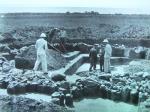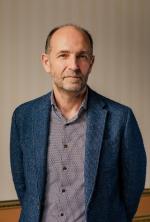
National-Socialist Archaeology in Europe and its Legacies
Duration: 2016-2023
Intended publication: edited volume
Partners: Springer International Publishing AG, Universalmuseum Joanneum Graz
More information:
Since the beginning of the nineteenth century, archaeology has developed into an important force behind processes of nation building. At the same time there were structures of transnational academic collaboration that strongly contributed to the internal dynamics of the primarily nationally organized research field. In those European countries that were confronted with national-socialist occupation and repression between 1939 and 1945, the transnational archaeological networks turned out to be an important starting point for developing national-socialist archaeological policies. Although there was no master plan, these policies generally included 1. highlighting of the Germanic past (via new monument acts, changes in academic education and the reorganization of museums), 2. stimulating the archaeology of ethnic ‘Germanic’ minorities and 3. developing archaeological propaganda in support of national-socialism. Excavating archaeological sites, formerly known as national, by national-socialist archaeologists (often together with collaborating archaeologists), and the looting and destruction of archaeological objects (on site or in museums) was a crucial part of this policy.
Yet, this volume will also show how national-socialist archaeology, to some extent being valued positively as highly innovative, influenced the archaeology of non-occupied countries and how, in the end, it generally failed to overtrump the national archaeologies of Europe. It furthermore analyses the long-term impact of national-socialist rule on the development of European archaeology. How did the attempts to create a unified European archaeology, although it was not publicly discussed for decades, after 1945 continue to influence networks, methods and terms, institutional structures or popular representations of the early past?
The volume consists of 27 chapters and is edited by the historian Martijn Eickhoff (NIOD), the archaeologist Daniel Modl (Universalmuseum Joanneum Graz), and the archaeologist Katie Meheux (Institute of Archaeology Library, University College London). Each chapter deals with a specific European nation of region (both sub-national and supra-national) and is written by (an) author(s) with institutional connections to the area involved. The structure of the book follows the chronology of the national-socialist expansion in Europe.
The book will be published by Springer International Publishing AG. The expected date of publication is 2023.
For information contact Erwin Nuijten: e.nuijten@niod.knaw.nl
Index
- Chapter 1: Introduction: Martijn Eickhoff - NIOD, Amsterdam, Daniel Modl - Universalmuseum Joanneum, Graz
- Chapter 2 - Germany: Dana Schlegelmilch - University of Marburg
- Chapter 3 - Austria: Daniel Modl, Gudrun Wlach - Wien
- Chapter 4 - Czechoslovakia: Petr Kostrhun - Moravské zemské muzeum, Brno, Martin Oliva - Moravské zemské muzeum, Brno
- Chapter 5 - Poland: Kamil Niedziółka - Institute of Archaeology and Ethnology, University of Gdansk
- Chapter 6 - Scandinavia: Malte Gasche - University of Helsinki
- Chapter 7 - Iceland: Angelos Parigoris - University of Iceland
- Chapter 8 - Benelux: Martijn Eickhoff, Erwin Nuijten - NIOD, Amsterdam
- Chapter 9 - France: Laurent Olivier - National Archaeological Museum, Saint-Germain-en-Laye
- Chapter 10 - Serbia: Aleksandar Bandović - National Museum, Belgrade
- Chapter 11 - Greece: Alexandra Kankeleit - Berlin
- Chapter 12 - Crete: Georgia Flouda - Heraklion Archaeological Museum
- Chapter 13 - Lithuania: Gintautas Zabiela - Klaipėda University
- Chapter 14 - Latvia: Zenta Broka-Lāce - Latvian Institute of History, University of Latvia
- Chapter 15 - Estonia: Erki Russow - Tallinn University
- Chapter 16 - Ukraine: Dmytro Teslenko - Dnipropetrovsk National University, Daniel Modl
- Chapter 17 - United Kingdom: Katie Meheux - Institute of Archaeology Library, University College London
- Chapter 18 - Ireland: Gabriel Cooney - UCD School of Archaeology, Belfield, Dublin 4
- Chapter 19 - Switzerland: Hansjörg Brem - Amt für Archäologie, Kanton Thurgau
- Chapter 20 - Spain: Margarita Díaz-Andreu - ICREA-Universitat de Barcelona
- Chapter 21 - Portugal: Sergio Gomes - University of Coimbra
- Chapter 22 - Italy: Massimiliano Munzi - Sovrintendenza di Roma Capitale, Stefan Altekamp - Institute of Archaeology, Humboldt University of Berlin
- Chapter 23 - Albania: Ilirjan Gjipali - Institute of Archaeology, Tirana
- Chapter 24 - Hungary: Laszlo Bartosiewicz, Stockholm University
- Chapter 25 - Romania: Laura Coltofean - Brukenthal National Museum, Sibiu
- Chapter 26 - Bulgaria: Raiko Krauß - University of Tübingen, Sven Conrad - University of Tübingen, Rumen T. Ivanov - Archaeological Institute with Museum of the Bulgarian Academy of Science, Sofia
- Chapter 27 - Croatia: Ana Solter - Archaeological Museum Zagreb, Dragana Rajković - University of Zagreb, Rajna Sosic Klindzic - University of Zagreb
- Chapter 28 - Epilogue: Tim Murray: La Trobe University, Melbourne
